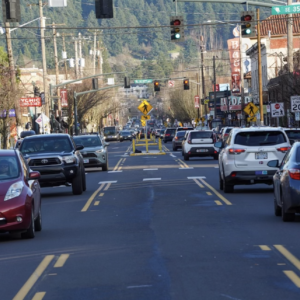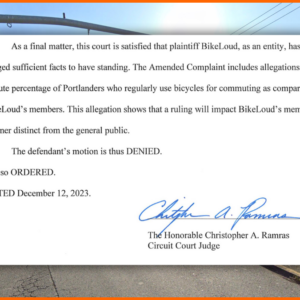Press release below:
DEEPLY FLAWED PROCESS LEADS TO FEDERAL LITIGATION OVER CRC MEGA-PROJECT
Portland, OR – Today, three groups – Coalition for a Livable Future, Northeast Coalition of Neighborhoods, and Northwest Environmental Defense Center – are filing litigation challenging the Columbia River Crossing Mega-Project.
The organizations are joining together to sue the federal agencies responsible for the CRC mega-project because they have not followed the environmental laws designed to ensure that development is safe for people and the environment. Their legal claims are based on concerns that the most expensive public works project in the region’s history has failed to consider even a basic analysis of key environmental issues.
“This project would harm our neighborhoods. It would significantly increase air pollution, funnel traffic into North and Northeast Portland, and lead to poorly planned sprawl. Our community needs smart transportation options so we don’t have to drive so much and travel so far.” – Steve Cole, Northeast Coalition of Neighborhoods
The claims are under the National Environmental Policy Act, which requires the government to study the health and environmental impacts of major projects, and the Endangered Species Act, which requires the government to ensure that massive projects in the river don’t destroy endangered salmon. The groups are represented by the Pacific Environmental Advocacy Center at Lewis and Clark Law School. The defendants are the Federal Highway Administration and Federal Transit Administration.
“This litigation is fundamentally about protecting our environment and our region. The CRC project is hugely expensive and deeply ill-considered. They have already spent $140 million in taxpayer dollars, and still haven’t created a sustainable, affordable project. We deserve better leadership that will go back and do it right,” said Tom Buchele, Managing Attorney for the Pacific Environmental Advocacy Center at Lewis and Clark Law School.
Issues in the case include the CRC’s failure to include a reasonable range of alternatives, instead creating a false choice between two extremes. The litigation also discusses the highway department’s failure to properly analyze air pollution, disclose the health impacts, and disclose the impact of additional traffic lanes on air and water resources, ecosystems and greenhouse gas emissions. They also repeatedly designed a public process that failed to include real public input.
“We want to see a less costly and more well-crafted solution to improve traffic reliability, create jobs, and protect community health.” said Mara Gross, Policy Director for Coalition for a Livable Future.
The Columbia River has historically had the largest salmon run in the continental United States. The Endangered Species Act claims result from CRC’s failure to adequately protect endangered salmon and other species in the river. The project ignores less damaging alternatives and fails to assess how the allowable salmon kill will impact total salmon in the river.
“The Columbia River is one of the most important rivers in the world, and supports one of the greatest salmon runs on Earth. The primary goals of this project can be achieved in a way that protects this important resource rather than jeopardizing it,” said Mark Riskedahl, Executive Director of the Northwest Environmental Defense Center.







Thanks for reading.
BikePortland has served this community with independent community journalism since 2005. We rely on subscriptions from readers like you to survive. Your financial support is vital in keeping this valuable resource alive and well.
Please subscribe today to strengthen and expand our work.
Could this post be tagged with “Columbia River Crossing?” TIA!